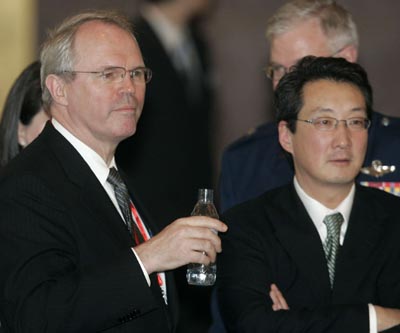N.Korea nuke talks get off to a 'good start'
By Le Tian (China Daily)Updated: 2007-02-09 06:56
|
|
China hopes the resumption of negotiations on the Korean Peninsula nuclear issue will be a "new starting point" in the process of making the peninsula nuclear-free, Deputy Foreign Minister Wu Dawei said yesterday.
Wu's remarks came as chief negotiators to the Six-Party Talks aimed at denuclearizing the Korean Peninsula reconvened in Beijing yesterday afternoon.
"I hope the meeting will be a good beginning for implementing the joint statement (of September 19, 2005) and become a new starting point in the process of denuclearizing the Korean Peninsula," said Wu, who is also the top Chinese negotiator to the talks.
The latest session of the six-nation talks, which involve host China, the United States, the Democratic People's Republic of Korea (DPRK), the Republic of Korea (ROK), Japan and Russia, will focus on the implementation of the 2005 joint statement and the actions to be taken by various parties in the initial stage.
Under the joint statement, the DPRK agreed to abandon its nuclear program in exchange for economic aid and security guarantees.
Wu appreciated the "close coordination and communication" among the parties following the last session of the talks, particularly, the "in-depth and productive contacts" between the chief delegates of the US and the DPRK, saying the efforts have provided a more solid basis for this session to make headway.
Chinese delegation spokesman Qin Gang told a press conference last night that the talks at Diaoyutai State Guesthouse were "candid and pragmatic".
"I would not like to say more optimistic or pessimistic about the talks as the negotiations were only in their first day, but I feel the consensus reached by related parties has broadened," Qin said.
Assistant Secretary of State Christopher Hill, the top US nuclear envoy, said yesterday that talks resumed on a positive note, and that all sides were hoping to achieve an agreement on the first steps for Pyongyang's disarmament.
"We had a good first day today," Hill told reporters. "We hope we can achieve some kind of joint statement here."
Media reports have suggested the US and the DPRK inked a memorandum during talks in Berlin last month, agreeing that Pyongyang's first steps toward denuclearization and US energy support should begin simultaneously.
However, Hill yesterday denied the signing of such a memorandum. "We had good discussions (last month) and want to see what we might do at the Six-Party Talks. We didn't sign anything," Hill told reporters.
Also yesterday, the DPRK expressed readiness to discuss the initial steps of nuclear disarmament, raising hopes for the first tangible progress for the six-nation talks since they were launched in 2003.
"We are prepared to discuss first-stage measures," the DPRK's nuclear envoy Kim Kye-gwan said on arrival at Beijing. But Kim said any moves by Pyongyang would be determined by the US attitude.
"We are going to make a judgment based on whether the US will give up its hostile policy and come out toward peaceful coexistence," he said, adding he is not "either optimistic or pessimistic" about the talks because there are still many points of confrontation to resolve.
The ongoing session is the third phase of the fifth round of the talks. The last session recessed without a breakthrough on December 22 last year after five days of tough negotiations.
Agencies contributed to the story
(China Daily 02/09/2007 page2)
|
||
|
||
|
|



